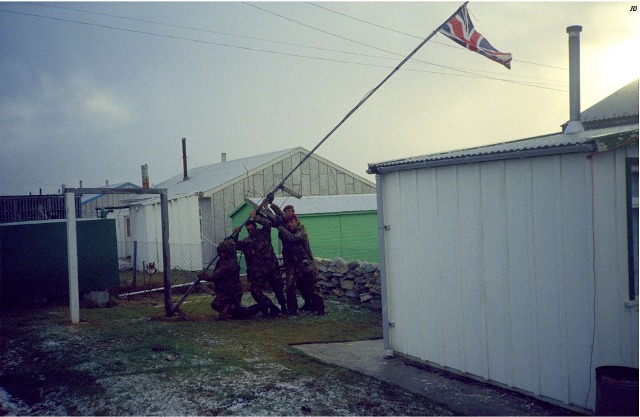 Photo from The British Falkland Islands & British Military Facebook site [@War1982]
Photo from The British Falkland Islands & British Military Facebook site [@War1982]
Special Issue in The Round Table, The Commonwealth Journal of International Affairs
Falklands Islands – 40 Years after the War
Call for Papers
As we build-up to the fortieth anniversary of the Falklands War, which took place between 2 April and 14 June 1982, it provides an opportune moment to reflect on the nature of the Falkland Islands at that time and the impact of the war, not just on the Falklands itself, but on the Commonwealth and the international community more generally. But of course that is only part of the story. It is important to recognise and evaluate the contemporary Falklands and its aspirations and challenges going forward. The special issue will offer a detailed and nuanced assessment of the modern Falklands and how it has been framed and its progress driven by the legacy of the war.
The ten-week war was precipitated by Argentina’s invasion of the Falklands and South Georgia, both British Overseas Territories. Soon after the British dispatched a naval task force to liberate them. At the war’s end 649 Argentines, 255 British, and three Falkland Islanders had died. The response of the international community was mixed, including in the Commonwealth, despite the strong support shown to the Falklands by Commonwealth Secretary-General Ramphal. In the immediate aftermath of the war the Falkland’s economic viability was in doubt, with sheep farming being the islands’ only industry. But, the creation of the Falklands Islands Development Corporation in 1984 and its plans for diversification and self-sufficiency were to be decisive in re-shaping the islands. Today, the Falklands is self-sufficient in all areas except defence and external affairs, and has several world-leading industries, including fisheries.
So, as noted above the special issue will reflect on aspects of the war, but also, and perhaps more importantly, consider the contemporary Falklands and the opportunities and challenges facing it. Submissions on the implications of Brexit; the Falklands’ role as a gateway to Antarctica; its demography; the role that fisheries and fishery protection plays; the quest for sustainability; and the geo-political relationships with Britain and Argentina, may all be worth consideration. But, this is by no means an exhaustive list, and we would welcome submissions on other topics too. The editors welcome contributions from across the academic disciplines (social sciences; history; geography; environmental science etc.), as well more personal testimonies reflecting on the development of the Falklands over the last four decades. Within this spirit the issue will contain longer, more academic contributions, and shorter opinion pieces and personal testimonies.
Full-length articles should be 4,500-6,000 words and opinion pieces 600-800 words.
Guidelines for authors can be found at: https://www.tandfonline.com/toc/ctrt20/current.
Schedule to publication
Submission of contributions – 1 November 2021
Contributions returned to authors for any revisions – mid-December 2021
Submission of final versions of contributions – 14 February 2022
Submission of all content to the Editors – 31 March 2022
Publication of special issue – June 2022
Contributions should be sent to the editors of the special issue. We are also happy to answer any questions about the issue and potential contributions.
Peter Clegg ([email protected]) and Kate Matheson ([email protected])



